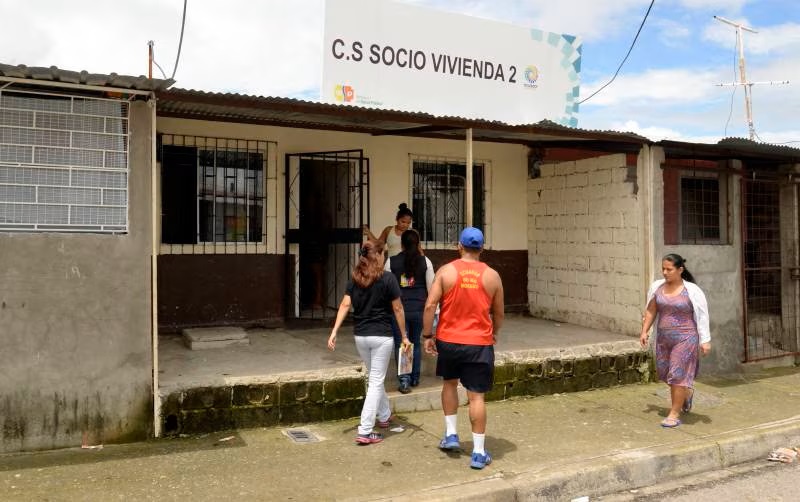In the northwest of Guayaquil, a once tumultuous neighborhood, Socio Vivienda, has experienced a curious transformation. What was once a hotbed of nighttime shootings and menacing confrontations between rival groups has given way to an eerie calm. However, this newfound tranquility is far from reassuring, as the criminal gangs that once terrorized the area now claim to be “protectors” of the local population.
For a deeper understanding of life in Socio Vivienda after a surge of violence that led to a month-long militarization of the neighborhood, we spoke to a long-time resident named “Pedro” (a pseudonym used for his safety). Pedro, 38 years old, has called this community home for nearly a decade. Socio Vivienda was established in 2012 to provide housing for families who were displaced from other areas.
Over the past month, Pedro has noticed an unsettling “rare tranquility” prevailing in the neighborhood. However, this calm comes at a price – the area is now off-limits to outsiders, and anyone who ventures in alone risks falling victim to robbery or kidnapping.
Ironically, it’s precisely during this period of supposed peace that Pedro contemplates leaving his home, a decision driven by concerns for the safety of his two young children. He reveals feeling persistently harassed, which casts a shadow over his daily life.
Gangs now offer ‘protection’
Socio Housing became a battleground where the Tiguerones and Los Lobos gangs, who had previously broken away from Los Choneros in 2021, confronted Las Águilas. The police have documented a litany of crimes in the area, including drug trafficking, home invasions, assaults, robberies, extortion, and kidnappings. Now, residents fear that the fragile truce between these groups may crumble at any moment.
Socio Housing 2, the most perilous sector with an expansive 40-hectare footprint, is flanked to the west by canals and vacant land, offering criminals easy escape routes and turning it into a strategic stronghold.
Pedro recounts the not-so-distant past when gunfights were a horrifyingly common occurrence. Families would huddle on the floor with their children while watching television, and even schools were not spared from this violence, making national headlines. But what changed after the intervention a year ago?
Following a month of militarization, intensive police operations, and numerous arrests, the gangs reluctantly brokered an informal truce. They recognized that the heightened attention was detrimental to their interests. Crime rates gradually decreased, to the point where for the past month, delivery trucks have cautiously returned to the streets, a stark contrast to the previous year when extortion had driven them away.
Yet, this newfound “protection” is nothing but a façade. Pedro reveals that the same gangs responsible for relentless robberies now control entry and exit points to the neighborhood. He describes the scene: private cars, disguised as shared taxis, charging passengers a fee of $0.25 per ride. Men with vests and radios closely monitor these vehicles, claiming to prevent robberies. In reality, it’s another tactic to exert control over who comes and goes, further highlighting their territorial dominance.
Pedro explains the limited safe options for transportation within Socio Vivienda: “The taxi cooperative that provides service inside Socio Vivienda is the only one that safely leaves and enters the sector because they already know the area and I suppose they also pay for their protection.”
Abandoned houses pepper each block, a testament to residents who grew weary of the constant threat of robbery and gunfire and decided to flee. In Socio Housing 2, the gangs forcibly expelled homeowners, converting their properties into criminal dens.
Pedro is contemplating leaving his home despite the apparent calm. The perpetual state of vigilance has taken a toll on him and his family. He confides, “What worries us is that any fight will break this supposed agreement between the gangs and that then all that violence repressed throughout this year will be released with greater force.” His children are confined indoors after 8:00 p.m., unable to enjoy the park or interact with others at school, where some classmates are the offspring of traffickers. Silence has become their survival strategy.
Police are powerless
Visitors are discouraged, as Pedro warns his family and friends not to even think about coming to visit unless they are already familiar with the area. The presence of police officers is visible in the mornings, with a police post fortified with sandbags. Yet, even the police are not immune to violence, as Pedro points out, “But how can you feel safe if the police themselves get shot?”
Personal safety is a constant concern, as Pedro experienced when his car window was shattered by a drug user attempting to steal his radio. He concludes with a sobering reflection, “Any disagreement can be a reason for them to attack you.”
In Socio Vivienda de Guayaquil, the delicate balance between fleeting calm and lurking violence continues to hold residents like Pedro and his family hostage. The gangs may have momentarily put their rivalries on hold, but their grip on the community remains firm, ensuring that fear and uncertainty persist.


0 Comments